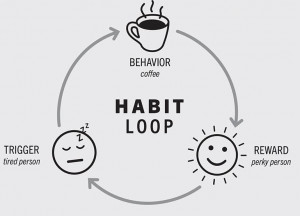© Pint of Science, 2025. All rights reserved.
This past year has been a tough one for a lot of us. On top of everything going on in the world, there seems to be an intense pressure to be more productive at home. Everyone assumes that we have more time on our hands as we aren’t out and about or, like me, you no longer have a commute to work. But this hasn’t translated into reality. I’ve heard countless people say they are feeling more tired, less able to focus or pay attention to tasks they need to do, even hobbies that were once deemed fun no longer interest them. So why is this the case? Why, on paper, does it seem like this is the perfect opportunity to say, clean out your wardrobe or deep clean the oven but in reality, we are spending our time distracted and doing anything but?
Well, let’s start with what actually goes on within the brain that helps us pay attention to our surroundings and the different tasks we need to do.
We might think that attention is mostly focused on what the eyes see, followed by a signal sent to the brain to focus on it. Actually, our intention is also at work here. Our brains are usually one step ahead of us and predict where our eyes are going to land next. This is based on what your intention is. For example, if you want to start writing something, your eyes will move to find paper and pen. Once we have locked into what we need to pay attention to, our brain filters out the other stimuli in the environment to focus onto that one thing. This voluntary system is also known as the Executive Control system. If this was the only mechanism, we would rarely get distracted.
Unfortunately for us, that is not the case. This system is not able to maintain control for very long, which is evident when we get tired or distracted from the task we are doing. So, what else is at play?
There are two other involuntary systems that have to work with the Executive Control function to help us focus. They are the reward and habit systems. These allow you to interact with items we like, and ignore things we don’t. It also tells us how to interact with each of them. For example, if you see an apple, your brain already knows if you like it or not, then it tells you to pick it up and take a bite of it. This is all learnt with experience over time.

The reward and habit loop - how our brain influences behaviour
You might be thinking this is all great information, but how can that change how I’m feeling now?
The current lockdown and the pandemic in general bring about a lot of shared feelings. We are all probably feeling a lot of anxiety, lockdown fatigue due to the constantly changing nature of it all. This, on top of the uncertainty of what’s around the corner and being inundated with information about various social issues, causes our brain to revert to behaviours that give us a dopamine boost. This means that the reward system is mostly at play compared to the executive system. In turn, we revert to habits and doing things we know that our brain enjoys, such as eating a certain food, checking our phones constantly and bingeing the latest tv show. It is our brain’s way of distracting us from those anxious feelings, but makes it harder for us to focus on anything that is productive unless it triggers our reward system. For some, there’s been more to think about during lockdown. Maybe you’ve had to start, juggling childcare alongside a full-time job. As attention is a limited resource, our brains find it hard to focus on each task at hand, and so getting distracted becomes very easy.
As lockdown restrictions begin to ease and we return to a little normality, our stress and anxiety should hopefully decrease. This will allow us to focus a little easier and have more of a capacity to concentrate on the tasks at hand.
I found a study of something that could ease stress levels in the meantime. It looked into how mindfulness could influence how well students could focus in stressful situations, such as timed tests. It found that the students who were better at being mindful performed better in the tests compared to the students who did not have this trait. This is just one example of how we can help ourselves during this time. It’s not simply about trying to push the distractions away but acknowledging them and understanding why we feel a certain way.
So next time you feel overwhelmed or maybe not as productive, take a step back, reflect a little and allow yourself to reset your mind.
About the Author
Jeniffer Jeyakumar graduated with a Biological Sciences degree specialising in Neuroscience in her last year, and has a passion for all things brain related. She currently works in science publishing learning about Open Access and the benefits of open peer review. She has a firm belief in accessible knowledge for all and therefore aims to communicate science to the wider audience. You can connect with Jeniffer on LinkedIn
Image from The Centre for Nutrition Sciences.


